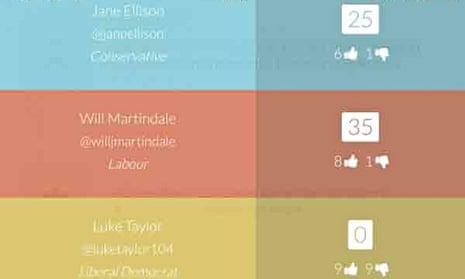Are your election candidates up to scratch on community issues? Whose opinions really chime with your own? And are ingrained allegiances clouding your judgement? Two teenagers have developed an app to help you find the answers.
Offering the digital-savvy a way to scrutinise those braying for their votes, Votr is the brainchild of Londoners Zak Cutner and Freddie Poser who turned their coding skills to politics – despite being too young to vote themselves. “We found an electoral commission survey which showed that young people wanted to know more about their candidates,” says 16-year-old Cutner. “So we chose to do something to do with the candidates and then we tied-in Twitter.” The upshot is Votr – an app that uses your postcode to collate the tweets of those gunning for election in your area and invites you to swipe, like the Tinder dating app, right if you like the tweet, left if you don’t and up if it leaves you cold. The identity of the tweeter, as well as overt party references, are obscured while you judge the posts, however a swipe down reveals your candidates’ names, parties and how they are faring in winning your approval.
Cutner and Poser believe that the party-blind nature of Votr’s system will challenge voters to consider policies, and candidates, without preconceptions. “It’s showing someone that there are other parties and they are saying sensible things – you can’t just write it off as right wing fascism and left wing socialism,” says Poser, 15. The pair also hope Votr will highlight the characters of local candidates, and their personal priorities. “The candidate is so important because they are going to be the person in the House of Commons,” says Poser. “So if you are voting for your candidate on the back of what their party believes maybe you’re not making a fully informed decision.” Ultimately, he believes, Votr offers a more nuanced portrait of candidates’ opinions and personalities. “What you are getting are the actual tweets of your candidates – it’s not a sanitised party line.”
Created as a prototype during a coding festival run by Young Rewired State last year, Votr was released on Google Play and the App Store this spring. And it is already attracting attention – not least from Silicon Roundabout’s Eileen Burbidge, co-founder of venture capital firm Passion Capital. “In terms of the younger generation and the younger voters I think apps like this are extremely important,” she says. “Not only because it brings [politics] to them but it’s in the way that they consume information.” British politicians, she believes, are not doing enough to engage with digital natives in their election campaigns, pointing by contrast to Hillary Clinton’s use of a video-sharing website in her bid to become US president. “She announced her campaign on YouTube, it wasn’t one of the national broadcasters or televised broadcasting, it wasn’t a broadsheet.” It’s a sentiment echoed by Cutner and Poser who discovered Twitter use varies hugely between candidates, from those who habitually tweet about local issues to others who shun the site altogether. “If they are not tweeting enough, and not about the issues, they are losing a valuable opportunity to show people what they really think,” says Poser.

Comments (…)
Sign in or create your Guardian account to join the discussion